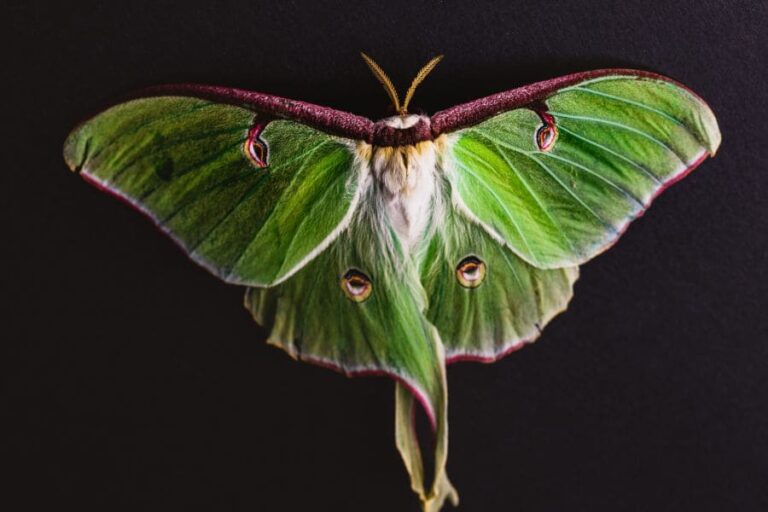In the Bible, moths symbolize fragility, transience, and destruction. They are often used to represent the impermanence of worldly possessions and the fleeting nature of human existence. For instance, Jesus warns against storing earthly treasures that can be consumed by moths, emphasizing the importance of spiritual wealth. In the Book of Job, moths are a symbol of human frailty, while in Isaiah, they signify the destruction of God’s enemies. Overall, moths serve as a symbolic reminder of the temporary nature of material wealth and the need to prioritize spiritual values.
How does Matthew 6:19-20 use moths to symbolize impermanence?
In Matthew 6:19-20, moths are used as a symbol of impermanence to convey a spiritual message about the fleeting nature of material wealth and possessions.
Matthew 6:19-20 – Jesus’ teachings on worldly treasures
In Matthew 6:19-20, Jesus provides a profound teaching on the impermanence of worldly treasures. He says, “Do not store up for yourselves treasures on earth, where moths and vermin destroy, and where thieves break in and steal. But store up for yourselves treasures in heaven, where moths and vermin do not destroy, and where thieves do not break in and steal.”
Treasures on Earth: Jesus contrasts treasures on earth with treasures in heaven. Earthly treasures represent material possessions, wealth, and worldly success. He warns against placing too much importance on these temporary, physical things.
Moths and Vermin: Jesus specifically mentions moths as agents of destruction for earthly treasures. Moths are known for eating away at clothing and other organic materials. This choice of symbolism emphasizes the gradual and inevitable decay of material wealth.
Theft: Jesus also mentions thieves as a threat to earthly treasures. Together with moths, this conveys the idea that not only are material possessions fleeting due to natural decay, but they can also be taken away by external forces.
Symbolism of moths consuming material possessions

The symbolism of moths consuming material possessions in this context carries several deeper insights:
Impermanence: Moths are used to symbolize the fleeting nature of material wealth. They represent the idea that everything material is subject to decay and loss. No matter how valuable or cherished, worldly possessions are ultimately temporary.
Value of Spiritual Wealth: Jesus encourages his followers to prioritize spiritual and moral values, emphasizing that treasures stored in heaven, such as acts of kindness, love, and faith, are everlasting. This contrasts with material possessions, which can be lost or destroyed.
Detachment: The symbolism of moths teaches the importance of detachment from worldly possessions. Excessive attachment to material wealth can lead to anxiety and suffering when these possessions are inevitably lost or deteriorate. By focusing on heavenly treasures, individuals can find a more enduring source of contentment.
Eternal Perspective: Jesus’ teaching calls for an eternal perspective. It invites people to consider the long-term consequences of their choices and investments, urging them to invest in spiritual growth and moral character, which have lasting value.
What does Job 13:28 reveal about moths and human frailty?
Here, moths are used metaphorically to illustrate the idea of human frailty and mortality.
Job 13:28 – Moths as a Metaphor for Human Frailty
In Job 13:28, the passage reads, “So man wastes away like something rotten, like a garment eaten by moths.” This verse employs the symbolism of moths to convey the concept of human frailty and vulnerability.
Comparing Humanity to Rottenness: Job draws a parallel between the wasting away of man and something rotten. Rottenness is a potent image of decay and deterioration, highlighting the inevitable decline of the human condition. This metaphor underscores the fragility of human life.
Moths as Agents of Decay: Moths are introduced as agents of decay, similar to how they consume clothing and organic matter. This choice of symbolism emphasizes the slow, insidious nature of the deterioration, as moths gradually eat away at a garment.
In this context, moths represent the various factors and challenges that contribute to the fragility of human existence, such as illness, aging, and adversity.
Temporal Nature of Life: The comparison between human life and a garment eaten by moths reinforces the idea that life on Earth is temporary and subject to gradual decline. It highlights the transient nature of human existence and serves as a reminder of mortality.
The Gradual Deterioration and Decay of Life
The use of moths as a symbol of fragility and the gradual deterioration of life in Job 13:28 carries several deeper insights:
Frailty and Vulnerability: This symbolism underscores the inherent fragility and vulnerability of human beings.
It reflects the reality that, over time, human bodies and circumstances can weaken and decay, making individuals susceptible to physical, emotional, and spiritual challenges.
Acceptance of Mortality: Job’s metaphor encourages an acceptance of the natural cycle of life, including its eventual decline.
Furthermore, it prompts contemplation about the impermanence of human existence and the need to come to terms with the limitations of mortality.
Spiritual Reflection: The metaphor invites individuals to reflect on their spiritual and moral lives in the face of life’s fragility. It suggests that focusing on one’s inner character and relationship with God can provide solace and purpose in the midst of life’s challenges and uncertainties.
Resilience and Growth: Despite the symbolism of gradual decay, this passage can also inspire resilience and growth. Just as a moth-eaten garment can be replaced or repaired, individuals can adapt and find strength in the face of life’s trials, aiming to emerge stronger and wiser.
How does Isaiah 50:9 use moths for symbolism of destruction?
Isaiah 50:9 – Moths Used in the Context of God’s Power and Protection
In Isaiah 50:9 (NIV), the verse states, “It is the Sovereign Lord who helps me. Who will condemn me? They will all wear out like a garment; the moths will eat them up.” This verse is spoken in the context of God’s power and protection.
God as the Helper: The verse begins by acknowledging God as the ultimate source of help and support. This sets the tone for understanding that God’s power and sovereignty are central to the message.
Wearing Out Like a Garment: The imagery of people “wearing out like a garment” emphasizes the temporary nature of human existence. Just as a garment becomes worn and old over time, human beings too experience aging and eventual mortality.
Moths as Agents of Destruction: Moths are introduced as agents of destruction in this context. They symbolize the gradual and inevitable decay and deterioration of worldly adversaries, challenges, and obstacles. The mention of moths implies that, despite their strength or threat, they are ultimately subject to the power of God.
Moths Representing the Destruction of God’s Enemies
In the broader context of the Bible, the symbolism of moths representing the destruction of God’s enemies carries several deeper insights:
Divine Authority: The use of moths in this context underscores the concept of divine authority and sovereignty. It suggests that God has the power to diminish or destroy any force or adversary that opposes His divine will.
Inevitability of God’s Will: Moths symbolize the certainty of God’s will and the ultimate fulfillment of His plans. Just as moths naturally consume garments, God’s purposes will be accomplished, and any opposition will be overcome.
Protection of Believers: The mention of moths in the context of God’s power and protection reassures believers of God’s watchful care. It implies that those who trust in God will find refuge and safety even in the face of adversity.
A Message of Hope: Despite the symbolism of destruction, this message can be seen as one of hope for believers. It signifies that God is capable of defeating any enemy or challenge and that those who rely on His strength need not fear.
How do moths compare to other Bible symbols?
Comparing moths with other biblical symbols can provide a deeper understanding of their significance:
| Comparison | Moths vs. Eagles | Moths vs. Olive Branch |
| Symbolism | Moths represent frailty and decay. | Moths represent impermanence. |
| Eagles often symbolize strength and | Olive branch symbolizes peace and hope. | |
| renewal in the Bible. | ||
| Contrast | Highlights vulnerability and resilience. | Highlights tension between worldly |
| impermanence and enduring hope. | ||
| Interpretation | Dual aspects of human existence: | Emphasizes the fleeting nature of |
| vulnerability and resilience. | worldly matters and enduring hope in faith. |
Highlight the unique aspects of moth symbolism
Moth symbolism in the Bible is unique in its emphasis on gradual decay, impermanence, and the gradual consumption of material possessions. Unlike other symbols that may represent renewal or strength, moths specifically focus on the transient nature of physical existence and the need to prioritize spiritual values.
FAQ’s
What does the moth symbolize in Christianity?
In Christianity, moths often symbolize impermanence, decay, and the fleeting nature of worldly possessions. They can serve as a reminder to focus on eternal and spiritual values.
What do moths mean spiritually?
Spiritually, moths can represent transformation, vulnerability, and the search for inner light. They are often seen as symbols of spiritual growth and self-discovery.
Does a moth bring good luck?
Moths are not generally associated with bringing good luck. In some cultures, they may be seen as omens or symbols of change, but whether this change is positive or negative depends on the specific beliefs.
What does it mean if a moth visits you?
The meaning of a moth’s visit can vary. Some people interpret it as a message to pay attention to their inner transformation or spiritual journey. Others may simply see it as a random occurrence without particular significance.
Are moths biblical?
Yes, moths are mentioned in the Bible in various contexts. They are used symbolically to convey messages about impermanence, decay, and the transient nature of worldly matters.
Do moths represent life?
Moths are more commonly associated with representing the fragility and impermanence of life rather than life itself. They symbolize the idea that all living things eventually decay and come to an end.
Do moths symbolize love?
Moths are not typically associated with symbolizing love. In literature and symbolism, love is more often represented by other symbols like hearts, doves, or roses. Moths are usually linked to themes of transformation and impermanence.
Final Thought
In conclusion, the symbolism of moths in the Bible is a multifaceted and rich motif that conveys profound lessons about the human condition and spirituality. Through passages like Matthew 6:19-20, moths serve as powerful reminders of the impermanence of material possessions and the need to prioritize spiritual wealth. In Job 13:28, they symbolize the fragility of human life and the gradual decay we all experience. Isaiah 50:9, on the other hand, employs moths to signify the destruction of God’s enemies and the might of divine authority.
As we explore other biblical references, we discover nuances in moth symbolism that highlight varying aspects of impermanence and decay, deepening our understanding of their significance. Comparing moths with other biblical symbols, such as eagles or olive branches, further illuminates the unique emphasis on fragility and impermanence inherent to moth symbolism.
Moreover, in the context of modern life, the symbolism of moths remains pertinent. It prompts us to reevaluate our priorities, encouraging us to balance our pursuit of material wealth with a focus on enduring spiritual values.

